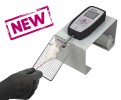Authors
Kim C, Kwak MJ, Cho SY, Ko AR, Rheey J, Kwon JY, Chung Y, Jin DK
Lab
Clinical Research Center, Samsung Biomedical Research Institute, Seoul, Republic of Korea
Journal
Orphanet J Rare Dis.
Abstract
BACKGROUND:
Mucopolysaccharidosis type I (MPS I) is caused by the deficiency of alpha-L-iduronidase (IDUA), which is involved in the degradation of glycosaminoglycans (GAGs), such as heparan sulfate and dermatan sulfate in the lysosome. It has been reported that joint symptoms are almost universal in MPS I patients, and even in the case of attenuated disease, they are the first symptom that brings a child to medical attention. However, functional tests and biological markers have not been published for the evaluation of the limitations in joint and locomotion in animal model-mimicking MPS.
METHODS:
We generated IDUA knockout (KO) mice to observe whether they present impairment of joint function. KO mice were characterized phenotypically and tested dual-energy X-ray absorptiometry analysis (DEXA), open-field, rotarod, and grip strength.
RESULTS:
The IDUA KO mice, generated by disruption between exon 6 and exon 9, exhibited clinical and laboratory findings, such as high urinary GAGs excretion, GAGs accumulation in various tissues, and significantly increased bone mineral density (BMD) in both female and male mice in the DEXA of the femur and whole bone. Remarkably, we observed a decrease in grasp function, decreased performance in the rotarod test, and hypo-activity in the open-field test, which mimic the limitations of joint mobility and decreased motor performance in the 6-min walk test in patients with MPS I.
CONCLUSIONS:
We generated a new IDUA KO mouse, tested open field, rotarod and grip strength and demonstrated decrease in grip strength, decreased performance and hypo-activity, which may be useful for investigating therapeutic approaches, and studying the pathogenesis of joint and locomotion symptoms in MPS I.
BIOSEB Instruments Used:
Grip strength test (BIO-GS3)

 Douleur - Allodynie/Hyperalgésie Thermique
Douleur - Allodynie/Hyperalgésie Thermique Douleur - Spontanée - Déficit de Posture
Douleur - Spontanée - Déficit de Posture Douleur - Allodynie/Hyperalgésie Mécanique
Douleur - Allodynie/Hyperalgésie Mécanique Apprentissage/Mémoire - Attention - Addiction
Apprentissage/Mémoire - Attention - Addiction Physiologie & Recherche Respiratoire
Physiologie & Recherche Respiratoire
 Douleur
Douleur Système Nerveux Central (SNC)
Système Nerveux Central (SNC)  Neurodégénérescence
Neurodégénérescence Système sensoriel
Système sensoriel Système moteur
Système moteur Troubles de l'humeur
Troubles de l'humeur Autres pathologies
Autres pathologies Système musculaire
Système musculaire Articulations
Articulations Métabolisme
Métabolisme Thématiques transversales
Thématiques transversales SFN2024: Venez rencontrer notre équipe sur le stand 876 à Chicago
SFN2024: Venez rencontrer notre équipe sur le stand 876 à Chicago 